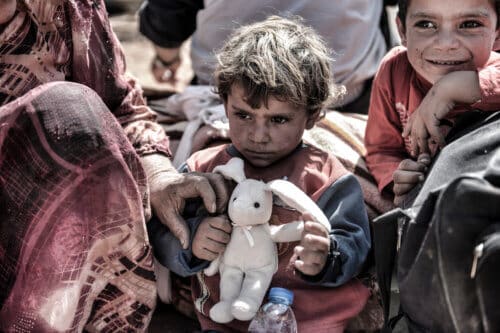A new study by Prof. Dan Rabinovitz from the Department of Sociology and Anthropology of Tel Aviv University states that the Middle East region is expected to undergo extremely extreme climate changes, which may cause devastating civil wars (and between states) that will threaten the integrity of the entire region as has already happened in Syria, Sudan and Darfur

New research by Prof. Dan Rabinowitz from the Department of Sociology and Anthropology of Tel Aviv University states that the Middle East region is expected to undergo particularly extreme climate changes, which may cause devastating civil wars (and between countries) that will threaten the integrity of the entire region.
The study deals with the Middle East in its broadest definition - 24 countries located between Iran in the east, Morocco in the west, Turkey in the north and Yemen in the south. Among other things, he discusses the effect of global warming on the agriculture that supplies our food, and anticipates which areas will see temperatures rise to such an extent that it will be impossible to live in them, where the rainfall will decrease to the point of an acute water shortage, and how all of this will affect social, political and economic processes in our region."
In his book 'The power of deserts' (The Power of Deserts), published by the prestigious publication of Stanford University, Prof. Rabinovitz discusses the issue of climatic inequality in the Middle East, which, according to him, is expected to be particularly dramatic due to the extreme climate changes, and full of conflicts between different countries and populations. "The fact is that the advanced and technology-rich countries (for example Israel and Saudi Arabia) produce most of the greenhouse gases that cause climate change, but in the end they will have the means to respond and protect their residents from the consequences; While precisely their poor and backward neighbors (such as Jordan and Yemen), which contribute very little to the climate crisis, will be the main sufferers from it - even though the climate conditions in the neighboring countries will be similar. These differences may create intense tensions between the different countries, which may reach the point of serious wars.
In addition, Prof. Rabinowitz believes that climate change is expected to lead to the migration of populations from different regions: "The collapse of agricultural areas will cause the migration of millions of refugees to places that will not be able to receive them, a scenario that may lead to tensions between groups, political instability and even civil wars." As an example, he cites events from the past, which took place in Syria, Sudan and Darfur, and says that future climate changes may trigger similar events on a much larger scale. "In the Middle East there are many poor countries whose economy depends on agriculture, with significant ethnic divisions, prone to this type of destructive processes," he warns.
From the Black Gold Age to the Age of Solar Energy
The last part of the book is specifically devoted to the six oil states of the Persian Gulf: Saudi Arabia, Kuwait, Bahrain, the United Arab Emirates, Oman and Qatar. According to Prof. Rabinowitz, "In the oil era of the last 70 years, these countries have accumulated legendary wealth, but the end of the 'Black Golden Age' is already on the horizon." Oil prices are steadily falling, among other things because the cost of generating electricity from alternative energy, and especially from solar energy, has dropped by 90% in the last decade, and its use has become economically competitive. This will soon be joined by the electric cars that do not need fossil fuels. In addition, these countries reside in one of the hottest places in the world, with a particularly high rate of warming as a result of climate change. In fact, from the middle or end of the 21st century it will be very difficult to sustain life in places like Dubai, Abu Dhabi and their neighbors, and this may further destabilize the entire region. Studies show that in the face of all these challenges, the oil countries of the Persian Gulf do not have an effective response, as of today."
In conclusion, Prof. Rabinowitz believes that in order to succeed in the transition to the new era, the oil countries must make a profound change in perception, use the great wealth they have accumulated and invest in solar energy technologies - both in the deserts close to home and around the world. "Since there is still no effective technology for accumulating solar energy and transporting it away from the place of its production, it is recommended to invest mainly in solar projects in North Africa and South America - sunny places that are relatively close to continents with high population and demand for electricity (Europe and North America, respectively)," emphasizes Prof. Rabinowitz. "In other words, instead of resisting and placing obstacles in front of the energy revolution, the Gulf countries must embrace the inevitable revolution, and translate their power in the dying oil market into a similar power in the growing alternative energy market. In addition to the economic gain, such a move will move the oil countries to the 'right side' of history - that of the fight against climate change, will raise their profile in the eyes of the peoples of the world, and will prevent unnecessary and bloody wars."
More of the topic in Hayadan:
